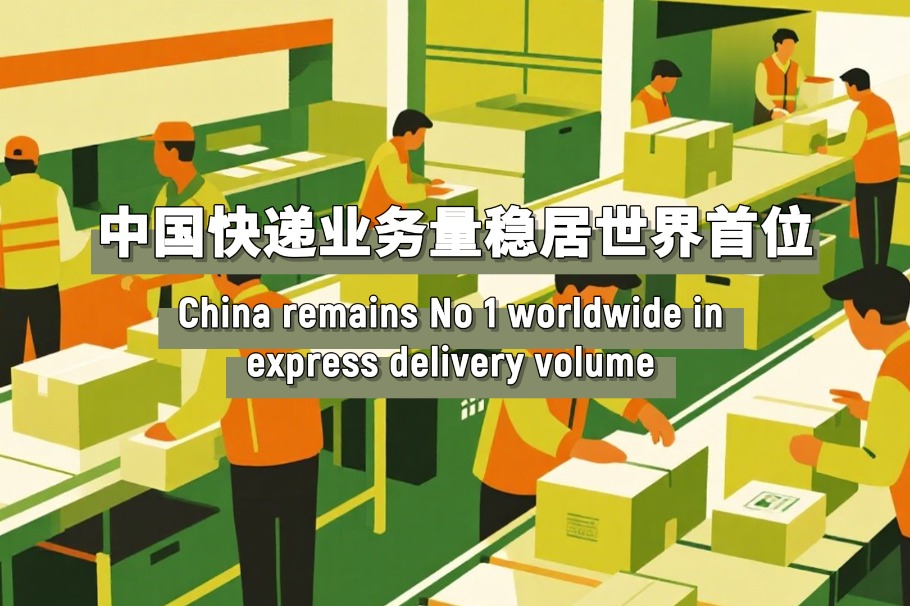China firmly upholding multilateral trade rules

The decision by China to engage in talks with the United States demonstrates its firm stance in upholding multilateralism and presents a new opportunity for the reform and improvement of the global governance system.
The post-World War II multilateral trading system, with the World Trade Organization at its core, advocates for members to resolve trade issues through equal consultation, multilateral negotiations, and dispute settlement, aiming to reduce tariff barriers and promote trade liberalization and facilitation. However, in recent years, the United States has frequently imposed unilateral tariffs, export controls, and extraterritorial jurisdiction based on grounds like "national security" and "America First".
This has severely undermined the effectiveness of the WTO's dispute settlement mechanism and multilateral rules. In particular, the so-called "reciprocal tariffs "introduced by the US government are not only a deliberate distortion and misrepresentation of the concept of "reciprocity" in international trade, but also completely disregard the WTO's principle of unconditional most-favored-nation treatment and its rules on tariff bindings.
This blatantly places self-interest above international rules and the interests of people worldwide. The resulting confrontation and countermeasures further weaken the authority of the multilateral trading system and obstruct the process of global trade liberalization and facilitation.
When tariff weapons replace rules-based dialogue and zero-sum games supplant mutual benefit and win-win outcomes, the multilateral trading system is facing its most severe crisis of legitimacy since the WTO' s establishment.
In response to US unilateral tariffs, China's actions have consistently been rules-based, demonstrating the responsibility of a major country. From the perspective of domestic law, China's justified countermeasures against US tariff bullying, based on laws such as the Foreign Trade Law, the Tariff Law, and the Customs Law, are taken to safeguard national interests and the fairness of international trade.
From the perspective of international law, China's countermeasures comply with WTO rules and the fundamental principles of international law. China has repeatedly sued the US at the WTO' s dispute settlement mechanism over tariff violations precisely to firmly uphold the authority and effectiveness of the multilateral trading system. Since its WTO accession in 2001, China's average tariff rate has dropped from 15.3 percent to 7.3 percent, and it has opened nearly 120 service trade subsectors, over-fulfilling its WTO accession commitments.
In recent years, China has also actively promoted WTO reform and participated in negotiations for new international economic and trade rules, demonstrating its support for the multilateral trading system. China's continuous advancement of high-level institutional opening-up, characterized by "inclusive openness", injects strong momentum into world economic development, standing in stark contrast to the US approach of "club-based rules".
China-US trade interaction should fundamentally adhere to the core principles and rules of the WTO. The US' abuse of tariffs severely violates WTO principles and rules, gravely damaging the WTO's authority and effectiveness. Dialogue should be used to reduce confrontation and urge the US to return to the multilateral framework. As the world's two largest economies, even limited consensus between China and the US on WTO and multilateralism issues can produce a significant demonstration effect.
Historical experience shows that the 1999 bilateral agreement between China and the US on China's WTO accession powerfully propelled the development of the global multilateral trading system. Today, if China and the US can find a "greatest common divisor" that aligns with both sides' interests through equal consultation, it could similarly serve as a catalyst for revitalizing the multilateral trading system.
China-US coordination can also help curb the global wave of protectionism. In recent years, global trade-restrictive measures have continuously increased. At a time when the global trade system faces a crisis of trust, dialogue between these two major powers itself sends a positive signal in support of multilateralism and against unilateralism. More importantly, if China-US trade frictions can be resolved through dialogue rather than confrontation, it will set a constructive precedent for other countries handling similar disputes, thereby reducing systemic risks in the global trade system. This demonstration effect helps stem the spread of protectionist tendencies and strengthens countries' confidence in the multilateral trading system.
Furthermore, China-US trade interaction plays a "ballast" role in stabilizing global supply chains. The economic and trade relationship between China and the US directly impacts the resilience and stability of global supply chains. "Decoupling" and "supply chain disruption" between China and the US not only affect the two countries but also have profound repercussions on the global market landscape.
For instance, in the semiconductor sector, even amid competition, China and the US need to establish a certain degree of "coexistence amid competition" mechanism to avoid exacerbating the global chip crisis through excessive confrontation. Practical cooperation between China and the US is precisely a concrete manifestation of the cooperative spirit advocated by the multilateral trading system.
Against the backdrop of China-US trade relations facing potential instability, the decision by China and the US to engage in dialogue transcends the bilateral scope. It has become a key variable influencing the future trajectory of the multilateral trading system and the global governance landscape.
In recent years, global governance mechanisms have increasingly been disrupted by geopolitical factors, with a clear trend toward the securitization of economic issues and the politicization of trade tools. China-US trade talks can help re-establish the weight of economic logic in global governance and prevent geopolitical competition from completely dominating the economic agenda. Particularly in the process of supply chain restructuring, how the two countries balance security concerns with economic efficiency will directly impact the future direction of global governance. China's emphasis on "opposing the politicization of trade issues", if reciprocated by the US, will create conditions for global governance to return to a professional track.
The international community expects the two countries to leverage wisdom and responsibility to translate this process into sustainable institutional outcomes. This will inject new vitality into the multilateral trading system, open new pathways for global governance, and ultimately benefit the economic well-being and common development of people worldwide.
The writer is dean of the School of Global Governance at Shanghai University of International Business and Economics.
The views do not necessarily reflect those of China Daily.

Today's Top News
- Hong Kong advances as global asset management hub
- Chili peppers every day can keep the doctor away
- Steel sector makes strides in profitability
- Rescue underway for trapped in landslide
- Japan needs to match words with deeds to prove it has learned Hiroshima lessons
- Pharmaceutical levies won't prompt reshoring: China Daily editorial






























